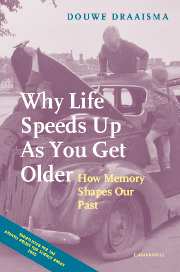Book contents
- Frontmatter
- Contents
- List of illustrations
- Acknowledgments
- 1 ‘Memory is like a dog that lies down where it pleases’
- 2 Flashes in the dark: first memories
- 3 Smell and memory
- 4 Yesterday's record
- 5 The inner flashbulb
- 6 ‘Why do we remember forwards and not backwards?’
- 7 The absolute memories of Funes and Sherashevsky
- 8 The advantages of a defect: the savant syndrome
- 9 The memory of a grandmaster: a conversation with Ton Sijbrands
- 10 Trauma and memory: the Demjanjuk case
- 11 Richard and Anna Wagner: forty-five years of married life
- 12 ‘In oval mirrors we drive around’: on experiencing a sense of déjà vu
- 13 Reminiscences
- 14 Why life speeds up as you get older
- 15 Forgetting
- 16 ‘I saw my life flash before me’
- 17 From memory – Portrait with Still Life
- Index of names
4 - Yesterday's record
Published online by Cambridge University Press: 22 September 2009
- Frontmatter
- Contents
- List of illustrations
- Acknowledgments
- 1 ‘Memory is like a dog that lies down where it pleases’
- 2 Flashes in the dark: first memories
- 3 Smell and memory
- 4 Yesterday's record
- 5 The inner flashbulb
- 6 ‘Why do we remember forwards and not backwards?’
- 7 The absolute memories of Funes and Sherashevsky
- 8 The advantages of a defect: the savant syndrome
- 9 The memory of a grandmaster: a conversation with Ton Sijbrands
- 10 Trauma and memory: the Demjanjuk case
- 11 Richard and Anna Wagner: forty-five years of married life
- 12 ‘In oval mirrors we drive around’: on experiencing a sense of déjà vu
- 13 Reminiscences
- 14 Why life speeds up as you get older
- 15 Forgetting
- 16 ‘I saw my life flash before me’
- 17 From memory – Portrait with Still Life
- Index of names
Summary
When I was about fourteen, I used to play draughts for my school, the Christian High in Leeuwarden. I was not particularly good but I played with great enthusiasm, even if with little expertise or talent. Early on I had drawn unwelcome attention to myself by falling into the opening-move traps which the boys who belonged to a draughts club had been warned about at their first lesson. Our best player was Johan Capelle. He would take the first board, the nextbest player would take board number 2, and so on. The weakest (‘the weediest’) player sat at the lowest board.
One day we were due to play against one of town's highergrade schools. Their number one board was taken by Harm Wiersma, thirteen years old but already a legend in Friesland. Before we started the match our team leader called us together. He had a plan. ‘This Wiersma is so good’, he explained, ‘that it would be a shame to waste our strongest player on him, because whoever plays him is bound to lose. Johan'll do better taking on their second board.’ We allowed the logic to sink in. ‘But then, following that argument, the one who, uh…’ someone started; he did not have to finish his sentence. Five or six members of our team turned as one towards me. I went bright red, nodded that I understood and took my seat at the first board.
Why do we have such a horribly good memory for our humiliations?
- Type
- Chapter
- Information
- Why Life Speeds Up As You Get OlderHow Memory Shapes our Past, pp. 45 - 48Publisher: Cambridge University PressPrint publication year: 2004

